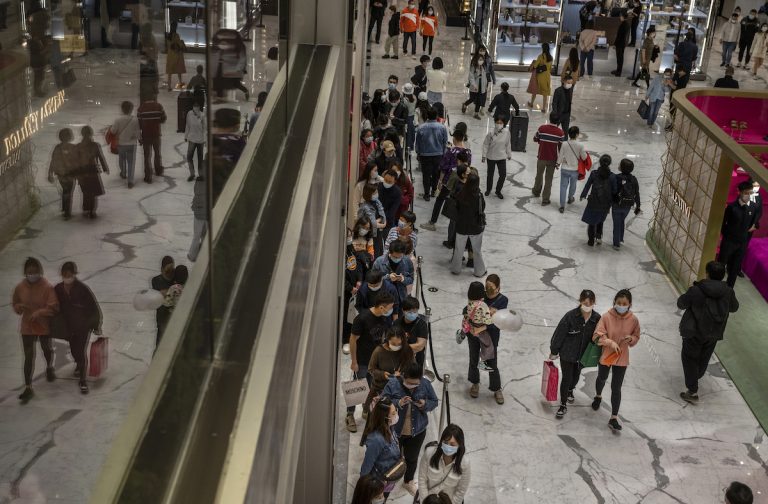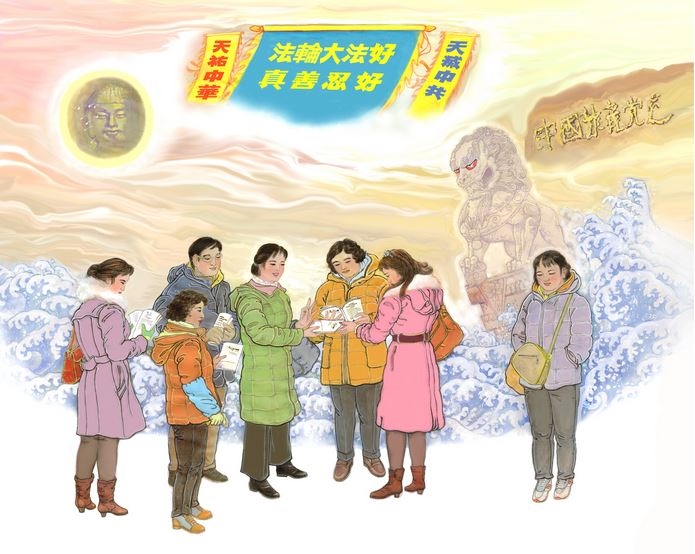Grappling with soaring living costs, a faltering economy, and rising unemployment rates, an increasing number of China’s youth have begun adopting a lifestyle called “’lying flat,” or tang ping (躺平) in Chinese.
The term refers to a social phenomenon where young professionals in the country opt out of the competitive rat race for jobs, success, and material wealth. They instead choose to lead a minimalist lifestyle with fewer pressures as a form of passive resistance to societal expectations.
Under a crimson banner proclaiming their collective liberation from “bullsh*t jobs,” young professionals in China have started throwing “resignation parties,” complete with gongs and drums, festive lanterns, and communal feasts to turn the end of their employment into an occasion for camaraderie, defiance, and new beginnings.
MORE ON CHINA’S ECONOMY:
- Major Money Managers and Investors Wary of China Amidst Losses and Regulatory Scrutiny
- As Economy Sputters, Chinese Turn to the Lottery for Hope
- From Evergrande to Country Garden: How China’s Property Titans Mirror Broader Economic Woes
- US Officials Highlight Depth of China’s Economic Crisis
While the celebratory tapestry may seem perplexing against the backdrop of China’s stringent social expectations, the lifestyle changes highlight a profound shift in the values of a young workforce determined to redefine success on their own terms.
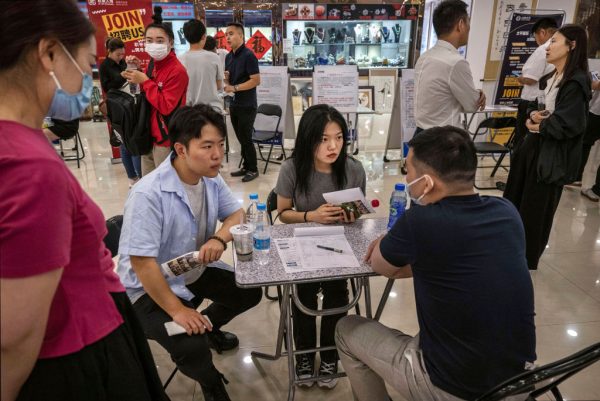
Success
You are now signed up for our newsletter
Success
Check your email to complete sign up
For Liang, a 27-year-old who has since embraced content creation and restaurant management, the decision to resign his old job in May has ushered in newfound happiness — echoing a sentiment widely shared across social media platforms by many young Chinese.
The roots of discontent
Adorned with a flower to signify the beginning of a new chapter away from the stifling confines of his former workplace, Liang’s resignation party was steeped in irony and festivity. With wedding-esque “double happiness” signs juxtaposed with tables laden with sumptuous fare and lanterns swaying in the breeze, guests celebrated under one shared yearning: To “eat well and drink well, escaping bitterness at the earliest.”
Speaking to CNN using a pseudonym to protect himself and his family from potential retaliation at the hands of the Chinese Communist Party (CCP), Liang recounted the creative suffocation he endured within his previous role as an executive for a bank’s public relations department. The monotonous grind drained him, he recalled, where innovative ideas were routinely extinguished. However, his recent career pivot has rejuvenated his spirits, he added.
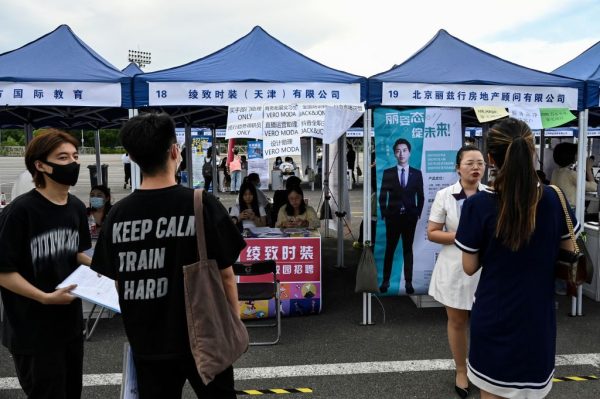
In recent years, the phenomena of “resignation parties” have gained traction online — mirroring the gradual re-awakening of a nation from the pandemic’s isolating grip and the country’s stringent “zero-COVID” policies.
Burnout on the rise
Within this milieu, Chinese youth, who are primarily in their 20s, cite a myriad of reasons for stepping away from their roles. From feeling burnout to the challenges of rising youth unemployment — where secure, well-paying jobs are becoming increasingly elusive — more and more people have begun searching for ways to lead a more balanced and meaningful existence.
A survey conducted by Maimai, China’s LinkedIn equivalent, revealed that out of 1,554 professionals polled between January and October 2022, an astonishing 28 percent had submitted their resignations within that year; with the figure doubling when considering those contemplating the same fate.
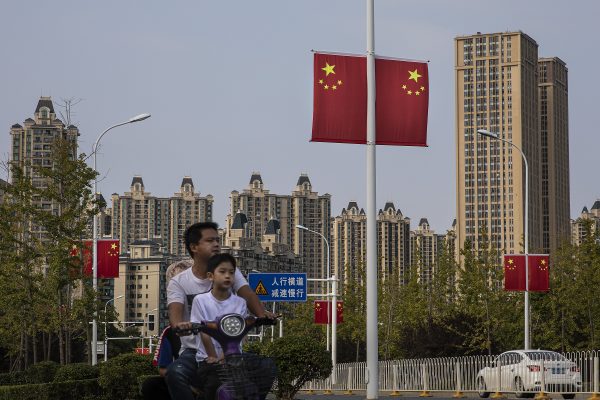
This wave of resignations is akin to the United States’ “Great Resignation,” which saw nearly 50 million Americans leave their jobs over two years. Now, while the American tide may be receding, China’s appears to be swelling.
Experts caution that this disillusionment could compound the nation’s economic woes, as demographic shifts foreshadow a diminished workforce brought about by dwindling birth rates and an aging populace.
RELATED: Women in China Urged To Spearhead ‘New Trend of Family’ Amid Dwindling Birth Rate
The pursuit of purpose
The relentless pursuit of academic excellence begins early for many in China — culminating in the high-stakes “gao cao” — the national college entrance examination. “The youth are dealing with a lot of disappointment and pent-up exhaustion and resentment from working so hard,” Nancy Qian, a professor at Northwestern University, told CNN.
Raised during an economic boom and shaped by China’s one-child policy’s legacy, these individuals carry the burden of heightened expectations, explained Qian. The promise of financial success — often lauded as the reward for their sacrifices — has clashed with the harsh realities of a sluggish economy and rising unemployment.
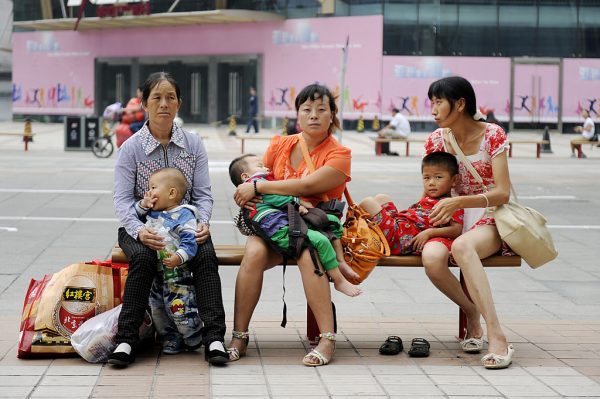
Meanwhile, young adults in China, having matured in more prosperous times, seek not just financial stability but meaning in their professional lives — something the current job landscape often fails to provide.
“The morals and work ethic they’ve been taught their whole lives,” Qian noted, “are now meeting the harsh reality of burnout.”
Long-term implications
Yao Lu, a sociology professor at Columbia University, points to a “structural imbalance” between the education received and the available job market. China’s education system has burgeoned, yet many find themselves in roles that underutilize their degrees — resulting in more burnout, unfulfillment, and job dissatisfaction.
“They are working in jobs that may be relatively stable, may pay reasonably well, but those are jobs that don’t typically need a college degree,” said Lu, describing how many educated Chinese youth are overqualified and have to settle for menial jobs including administrative roles in local district offices and as couriers or food delivery drivers.
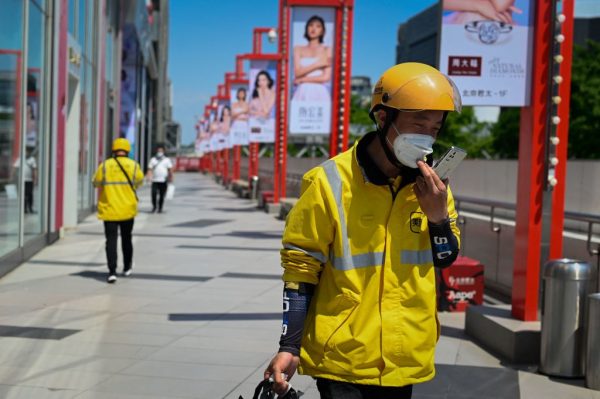
China’s dwindling fertility rates and the burgeoning elderly demographic present also further complicates matters. The exodus of disillusioned youth from the workforce may precipitate a deeper crisis, Qian points out: A reduced number of workers to sustain the aging population.
“The worst case scenario [would be] if the dispirited youths permanently drop out of the labor force, which will mean even fewer workers to support the elderly in the years to come,” said Qian, adding, ““Anything that pushes fertility rates even lower is a serious concern for the future.”



